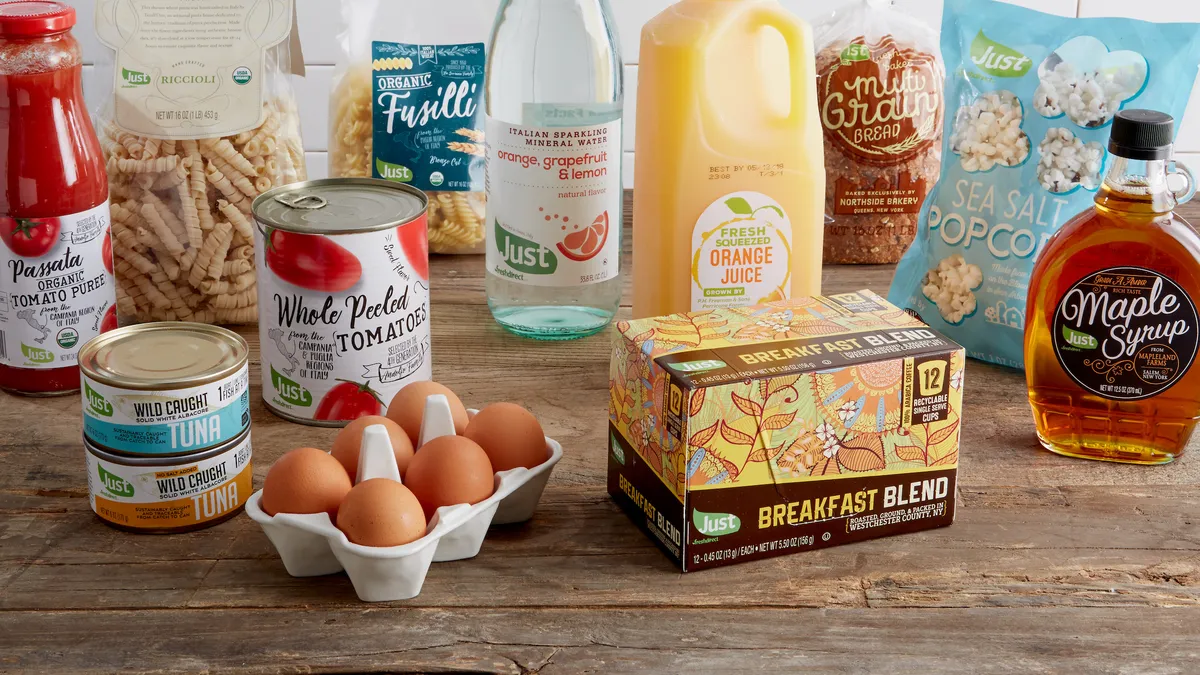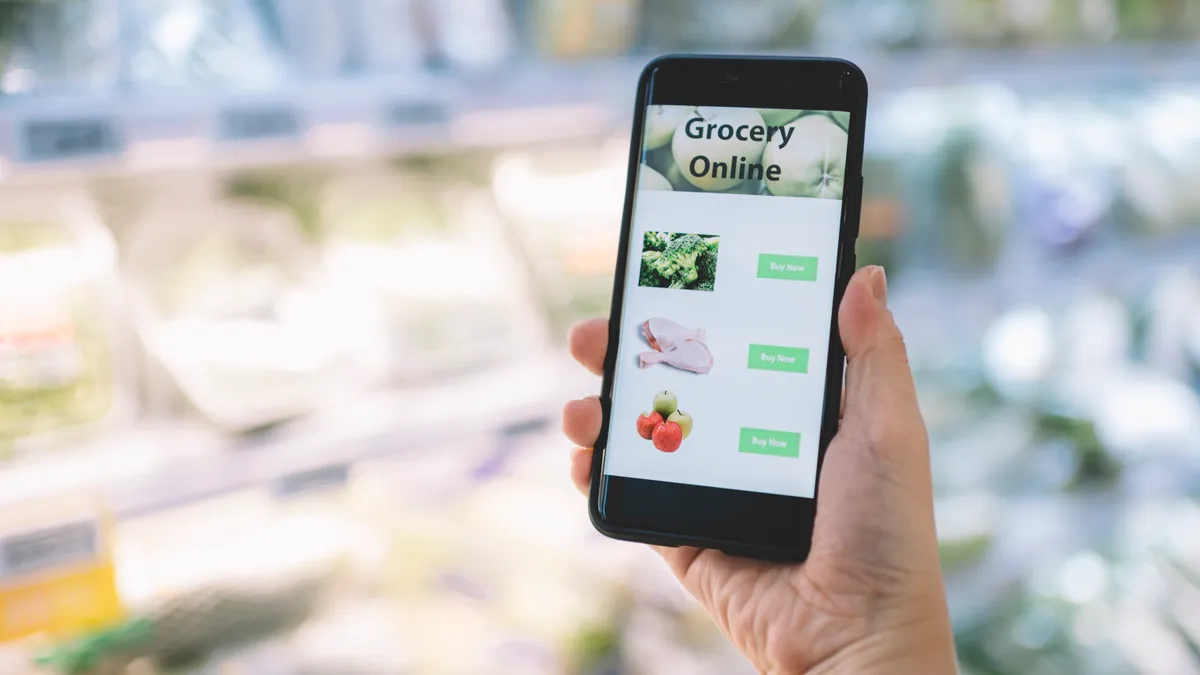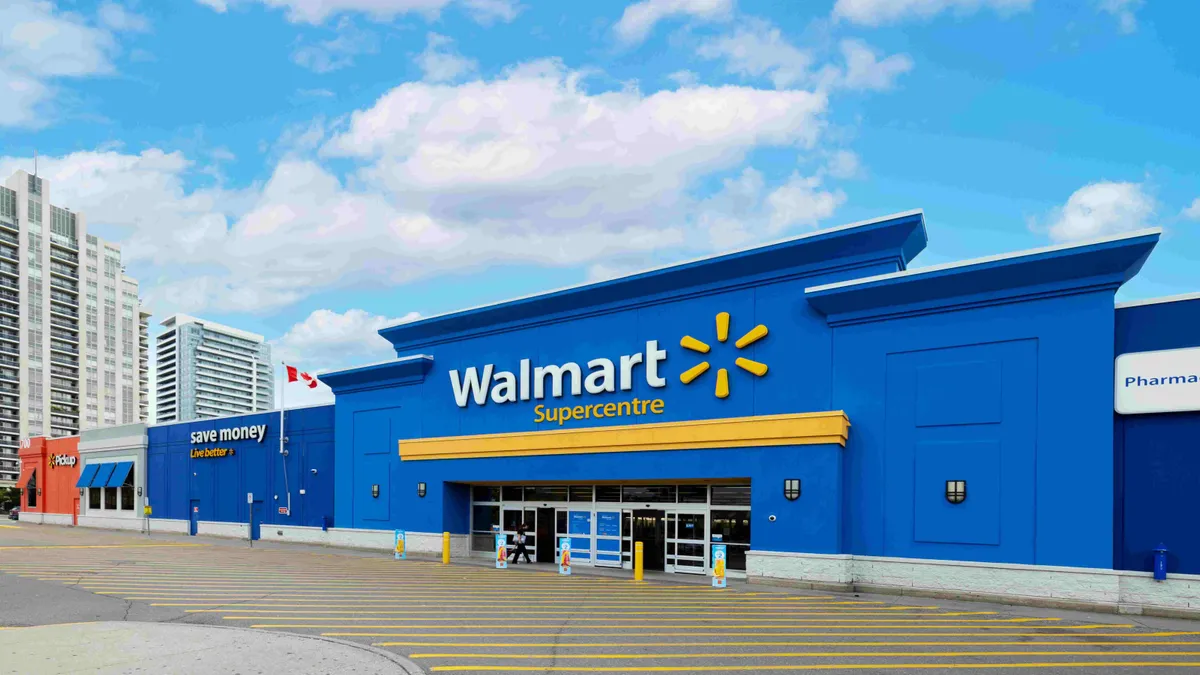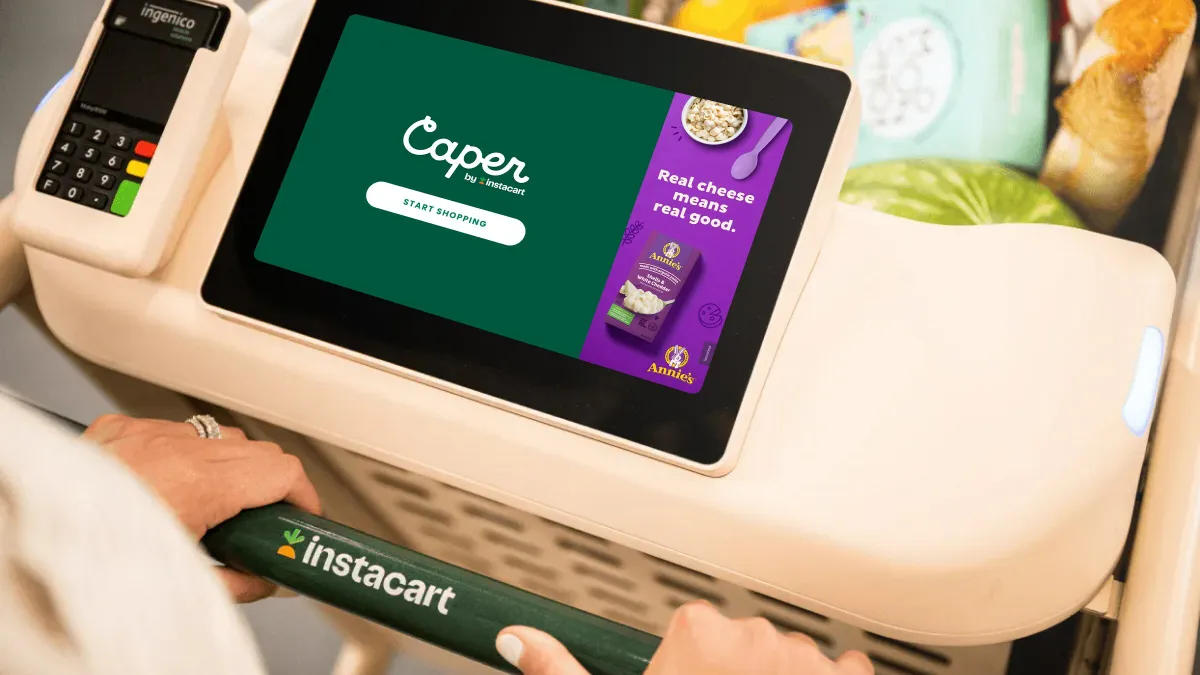In just six years, FreshDirect’s Just brand has become a household name with shoppers in the northeast. Encompassing a wide range of fresh and shelf-stable products, the private line has evolved considerably in that time and now plays an important role in the e-grocer’s fight to win over shoppers in some of the most competitive markets in the country.
In an interview with Grocery Dive, Carrie Mesing, vice president of merchandising with FreshDirect, credited an innovative spirit and a focus on transparency — not to mention growing demand for store brands — with the line’s success to date. FreshDirect sources Just products from dozens of small-scale farmers and artisans. Its organic milk comes from a cooperative of farmers in upstate New York, while its canned tuna comes from a boat called The San Pablo and its captain, Shawn Ryan, operating in the Pacific Northwest.
Being an online grocer gives FreshDirect the chance to educate shoppers in-depth about these relationships.
"We are really thoughtful about the partnerships that we're entering into on private brand and that helps us to develop a strong working relationship with them,” Mesing said. “That removes the conversation from cost and other aspects so that we can really work together as partners to make sure that we're communicating value to our customers whether that be in price or in other attributes."
Winning with transparency
Increasingly, transparency is exactly what consumers want. According to a new report by Label Insight and the Food Marketing Institute, shoppers are demanding more information and a closer connection to their food, and 75% of them would switch to a brand that provides more product details. The report also said that 61% of consumers are willing to pay more for in-depth information and 26% said they shopped for groceries online in the past 30 days.
We were really thoughtful about each and every item that we brought into the line and we've seen in most cases our household penetration exceeds the national average and in pretty much every category we've launched

Carrie Mesing
Vice president of merchandising at FreshDirect
With most well-known canned tuna brands, for instance, consumers often don't know how the fish is caught or what type of tuna it is, Mesing said. That same tuna is often cooked multiple times, processed and injected with additives, she noted. FreshDirect’s canned tuna, meanwhile, identifies Captain Ryan on its website and on the product label. He works with a processor that hand filets the tuna, cuts it into loins and cooks it only once, resulting in a higher quality fish.
The retailer has applied this strategy to numerous other products, as well, including popcorn and eggs.
“Private label is really an extension of your company values and so for us, it was a way to bring forward products that our customers can experience and interact within a physical location and especially as an online retailer that was really important,” said Mesing.
The retailer’s transparency and single-sourcing method fall squarely in line with shopper demand, but its very specific item-level source marketing would seem to reveal too much about the retailer's procurement methods. Not so, says Mesing.
“Most retailers guard their source because that’s their competitive advantage but at FreshDirect, this was a natural extension of who we are because we value our relationships," she said. "We celebrate them. So while this is something that was a very foreign concept in private brands, for us, it was a natural extension of who we are."
Being first to market
For retailers like Publix or Costco, private label quality and success takes time to develop. So how does an online retailer do that in just a few years time? FreshDirect has evolved the brand from the ground up by asking customers what exactly they expected from the company's private label products.
"As a result, we were really thoughtful about each and every item that we brought into the line and we've seen in most cases our household penetration exceeds the national average and in pretty much every category we've launched," Mesing said.
In the past, private brands have waited for national retailers to enter into the space first before taking the leap. But as an exclusively online retailer, FreshDirect is able to leverage its detailed, real-time data and go first to market with new offerings.
Being the first in the industry is what gives a brand its name recognition, said Aimee Becker, senior vice president of strategic services at Daymon Worldwide, a retail services firm that worked with FreshDirect to develop Just.
It’s important that retailers focus on innovation that fills the gaps that national players don’t fulfill, she noted, like local sourcing or dairy-free options. Unfortunately, Becker added, most retailers don’t want to spend the money to innovate, can't come to a consensus, and don’t want to take the risk. In many cases, retailers’ private label brand consist of national brand copies.
“The reality is 98% of the products in a retailer today are identical between retailers," Becker said during a presentation at Groceryshop. "So basically that's saying that our assortment is not really differentiated if only 2% is something that a consumer can only find in your store."
Still, even retailers with top private label brands are afraid to step on the toes of national brands and risk fracturing that relationship.
“The last thing you want to do in building your private brand program is trade consumers from a national brand to a private brand," Diana Sheehan, vice president of retail and shopper insights at Kantar Consulting, said during a presentation at Groceryshop. "National brand manufacturers and the retailer can be working together to grow categories, instead of looking at each other and adversarially because it really should be, what can we do to grow the category, grow everybody's profit, and raise margins?”
Just some friendly competition
As the quality of private label brands improves, the category is growing three times faster than national brands, with the majority of growth lying in the premium category. Just consists of numerous premium selections whose quality is national brand equivalent or above, Mesing explains.
The retailer is also making an effort to incorporate leading trends into its private label product portfolio. As people are snacking more, for instance, FreshDirect looks for ways to bring more shelf-stable products into that space as well as examine fresh food opportunities like value-added fruits and vegetables, pre-marinated meats and so on.
"National brand manufacturers and the retailer can be working together to grow categories, instead of looking at each other and adversarially because it really should be, what can we do to grow the category, grow everybody's profit, and raise margins?"

Diana Sheehan
Vice president of retail and shopper insights at Kantar Consulting
But can Just stand out against other fast-evolving store brands from retailers like Jet.com, Amazon and Target? Jet recently rolled out a Uniquely J line that targets millennials, while Amazon has played up Whole Foods' 365 Everyday products online. Target, with its growing ranks of small stores targeting the same cities where FreshDirect operates, is pushing into new store brands and rolling out trendy options like almond milk ice cream under its Archer Farms grocery brand.
In the New York City market where it originated, FreshDirect has enjoyed a leading position, but competitors are eager to disrupt that. Walmart-owned Jet has opened a dedicated online fulfillment center in The Bronx, while Whole Foods stores in New York and elsewhere now offer heavily discounted online delivery for Amazon Prime members.
The e-grocer takes in an estimated $800 million in annual revenues and has more than doubled its sales since 2012, according to Bloomberg. Its service area stretches from Washington, D.C. up to Connecticut, with plans to bring Boston online soon.
As it expands to new territories while also defending its established turf, FreshDirect will rely on private label to stand out from competitors and fill the white space left by national retailers. Six years ago, the company bet that a transparency-focused, trend-forward private label line would fit the bill. Mesing said that mission remains the same, but so much else about the brand has evolved and will continue to do so.
"This idea of authenticity and transparency has caused us to build a private brand program that I'm proud of. But frankly I don't think we're doing enough," said Mesing. "When I think about our industry as a whole, I think the idea of transparency and source and ingredients should be table stakes. I believe as industry experts, we have the authority and the knowledge to bring forward innovation that can really improve our customer's lives."





















